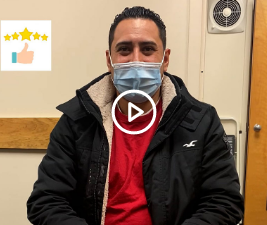Workplace Genetic Discrimination
Labor & Employment Lawyers
If You Believe You May Be A Victim Of Workplace Genetic Discrimination, our Law Firm Can Help. El-Hag & Associates Represent Employees Who Have Been Discriminated Against in the Workplace Because for Genetic Reasons

Experiencing Discrimination?
If you believe you have been victim of Genetic discrimination at work, contact our experienced labor and employment workplace genetic the discrimination lawyers to discuss your case.
Genetic Discrimination
Speak out if you experience workplace genetic discrimination. If you know someone who has experienced workplace genetic discrimination, speak out on their behalf and encourage them to seek legal recourse
Discrimination Lawyers
Our Lawyers Could Help You File Complaints With the Appropriate Federal, State,andLocal Agencies and the Courts Should Legal Action Be Required and help to legally protect you from any retaliation against you by your employer or coworkers


“El-Hag helped me recover $100,000 in unpaid overtime because the time spent traveling was not paid”
WHY CHOOSE US
GENETIC DISCRIMINATION IN THE WORKPLACE LAWYER NY
- We only represent employees and workers in forming a job union. We do not represent businesses.
- WWe Will Fight to Get You Compensation for Your Genetic Discrimination
- Get a Free Confidential Consultation
- No upfront fees or retainers –
we get paid only if You are Successful In forming your union. - 8 in 10 clients recover tens of thousands
and 2 in 10 can recover life changing amounts.

GENETIC DISCRIMINATION IN THE WORKPLACE LAWYER NY
We’ve helped employees just like you recover millions in damages. We can help you too!
Genetic information discrimination in the workplace is when an employee or job applicant is treated less favorably than others because of their genetic information. In New York, there are several laws that protect employees from genetic information discrimination in the workplace. These laws that protect employees in New York can be used by employees to protect themselves from discrimination based on their genetic information.
Genetic information is any information about a person’s genetic makeup, including DNA and RNA. It can include information about a person’s ancestry, genetic disorders, and health conditions.
Do you think that you might have been a victim of gender discrimination? The labor and employment law firm of El-Hag & Associates, P.C can help you. Our Westchester, New York gender discrimination law firm specializes in workplace Genetic information discrimination and workplace harassment. We have recovered millions of dollars for victims of workplace discrimination. We have brought discrimination lawsuits against small businesses and major multinational corporations and have achieved excellent results for our clients.
If you think you might be a victim of workplace Genetic information discrimination, please call us today for a free consultation. We can quickly assess your case and let you know the options available to you. In most cases, it is exceedingly difficult to prove Genetic information discrimination because there is no “smoking gun”, so it is best to schedule a consultation with our employment and labor law firm and review the facts.
WHAT IS WORKPLACE GENETIC INFORMATION DISCRIMINATION
Title II of the Genetic Information Nondiscrimination Act (GINA) of 2008 is a federal law that protects employees from genetic information discrimination in the workplace. The statute applies to all employers with fifteen or more employees, including state and local governments. GINA prohibits an employer from discriminating against an employee because of his or her genetic information, including using genetic information to make decisions about hiring, firing, promotions, compensation, benefits, and job assignments. Genetic information discrimination in the workplace is a form of discrimination that happens when an employee is treated differently than when an employer treats an employee or job applicant differently because of their genetics. Genetic Information discrimination can occur in the hiring process, job assignments, promotions, and other aspects of employment.
The law provides several exceptions, such as when an employer is required by law to use genetic information or when using genetic information is part of a legitimate program designed to achieve a lawful business objective. GINA also allows an employer to require employees to undergo genetic testing only if the testing is reasonably related to the performance of the employee’s duties. Employers must take reasonable measures to prevent unlawful discrimination and comply with any court orders concerning investigations or lawsuits arising from discrimination claims under GINA. Penalties for violating the statute can include fines and/or imprisonment.
Genetic information discrimination in the workplace is a reality for many employees in New York. Employees should be aware of their rights and what they can do to protect themselves from discrimination based on their genetics. Protect yourself by knowing your rights under state and federal law. Each state has its own laws protecting employees from genetic information discrimination, and the US Constitution protects all individuals from discrimination based on race, sex, national origin, and other factors. If you believe that you have been discriminated against based on your genetics, talk to an attorney.
Genetic information discrimination is an issue in New York, where employers cannot legally require employees to disclose any genetic information before hiring them or making any decisions about their continued employment in certain jobs, unless it is even if an employee does not have any genetic information that could be used to disadvantage them, revealing this information can still put them at a disadvantage in the workplace.
Some employers have argued that they need access to this information to ensure that they’re hiring the best candidates for the job, while others have claimed that they need to know this information to make reasonable accommodations for people who have specific genetic conditions. Or that they believe certain genetic conditions could be affected by toxic work environments that workers are sometimes subjected to. Generally, regardless of the reason, Genetic Information Discrimination is illegal in New York, and employees should not have to disclose their genetic information to secure a job or keep their job.
Examples Of Genetic Discrimination In The Workplace
- Pay disparities between an employee that has a genetic defect and all other employees that don’t will equally performing the same job
- Promotions and job opportunities that are not equally available to all employees based on genetic information
- Failing to provide equal access to development and training opportunities
- Harassment such as intimidating comments, gestures, and jokes harassing or intimidating the employee based upon their genetic information
- Not offering an employee who hasa sickle cell anemia gene fringe benefits but giving them to healthy employees
- Employer gives benefits to healthy employees’ families while not providing benefits to employees or their families if they harbor a gene for sickle cell anemia, heart disease, cancer, or other illness or disease regardless if the employee or their family member currently has the diseas
- Getting Paid less salary than males doing equivalent work
- If in the course of a job interview you are asked if you or any family members of health problems, or whether you or any family members had heart disease, cancer, or other illness
What Is Not Genetic Information Discrimination or Harassment

It is not harassment when people in the workplace make petty slights, are annoying, or make isolated discriminatory or derogatory remarks (unless extremely serious) about your gender. To be unlawful, the conduct must create a work environment that would be intimidating, hostile, or offensive to reasonable people
Genetic Discrimination. Genetic Discrimination must occur because of your being part of a protected class. For example, an employer can decide that he will fire any person if they come 1 minute late to work, even if it happened only 1 time. But it would be discriminatory if the employer said that he will only apply that policy to employees with one or more of the genes for colon cancer, whether they currently have it or not.
- They inadvertently acquired genetic information such as overhearing a conversation about an employee or family member’s illness
- As part of Wellness programs offered by employers voluntarily
- Family medical history as part of the certification process for FMLA or under any state, local, or employers’ policy.
- Genetic Information is obtained if an employer stumbles upon your genetic information in any public information source
- To monitor the effects of biological toxic substances as required by state law, where the program is voluntary
- law enforcement that engages in the forensic lab for the purposes of identification only
Our NY Genetic Information Discrimination Law Firm Will Fight to Get Your Money
If You Believe Your Employer Has Discriminated Against you Because of a Your Genetic Information We Can Help You Recover What Is Rightfully Yours
- No upfront fees or retainers – we get paid only if YOU get paid
- 8 in 10 clients recover tens of thousands, and 2 in 10 can recover life changing amounts.
- Generally takes 4 – 9 months from start to money-in-your-pocket
- Our workplace genetic Information discrimination lawyers will know how to best collect evidence to prove your case and build a strong argument.
- Our experienced workplace genetic information discrimination attorneys can negotiate on your behalf to get you the best possible outcome.
- Our genetic information discrimination lawyers can help you file a claim with the Equal Employment Opportunity Commission, which is the federal agency that handles Gender discrimination claims, and The New York State Division of Human Rights, Department of Labor, and other relevant agencies and bring your case to court which is unnecessary in most cases.
- Protection from revenge – your boss can’t fire you, change your hours or mess with your work environment, or harass you due to your genetic information discrimination and harassment claims against them – your boss can’t fire you, change your hours or mess with your work environment due to your genetic information job discrimination claim
- You can recover money from any company you worked for in the past three years for workplace discrimination
- We’ll do all the hard work to get you your Money. You just need to give us the details. You (usually) won’t even have to show up
- You can get your job back or front pay instead of getting your job back so you have money in your pocket while you look for another job.
- Hiring our experienced NY workplace genetic information discrimination law firm gives you the best chance of recovering the money that you deserve. Our workplace discrimination law firm gives you the best chance of recovering the compensation that you deserve
How Do You Win An Workplace Genetic Information Discrimination Lawsuit?
There are several factors that you must prove to win an employment genetic discrimination lawsuit. If you can answer yes to the following questions, you may have been a victim of employment discrimination:
2) Did something bad happen to you at work? This is known as an “adverse employment action”. You must be able to show that something bad happened to you at work. Examples of adverse employment actions include:
• Being fired
• Being laid off
• Not receiving a raise
• Being demoted
• Being passed over for a promotion
• Being harassed at work
3) Are you a member of a protected class? To prove employment discrimination, you must show that you are a member of a “protected class”, for example you have a qualified disability that doesn’t affect job performance
4) Were you qualified to perform the job at issue? You must be able to demonstrate that you had the right skill set to perform the job at issue despite your disability.
• An example of being unqualified- is if you apply for a job as a lawyer, but you don’t have a law degree, you won’t be able to say that you were discriminated against if a law firm did not hire you.
• An example of being qualified and passed over in a discriminatory situation would be if you had the same or greater abilities than others who applied for a job position. You and the person without a disability had equal experience working in the position you were applying for. If the other individual was hired, but you were not, the company will have to be able to provide a legitimate reason that you, as a qualified individual, was passed over for the job.
5) Does it seem likely that Genetic information discrimination occurred because you are a member of a protected class? This means that there is some evidence that shows that something bad happened to you at work BECAUSE of your or a family member’s genetic information. There must be a believable cause-and-effect relationship between your gender and the negative job action. For example:
• You were fired BECAUSE of your GENETIC INFORMATION
• You didn’t get a raise BECAUSE of your GENETIC INFORMATION
• You were fired BECAUSE of your GENETIC INFORMATION
6) Is your employer’s reason for taking the adverse action a lie (“Pretext”)? Your employer can take any negative action in the workplace as long as there is a legitimate reason for it, and it is not retaliatory. In almost 100% of discrimination cases, your boss is going to have an excuse that explains why you were treated badly. Your responsibility is to demonstrate that your boss’s excuse is not true and that the real reason is genetic information discrimination. For example, if you have congenital heart disease (present since birth) and your employer fired you because you performed your job poorly or had a bad attitude, your boss can terminate you. But if the other co-workers without any adverse genetic information act the same way and perform the job the same way as you, then your employer’s excuse that you performed poorly is most likely a lie.
Case Results
James
recovered $160,000 in severance pay and left work on his own terms.
Katrina
recovered $60,000 when her employer denied her leave for her disabled child (3 years pay)!
Tony
recovered $50,000 for losing his job after his boss made racists comments!
Monica
recovered $25,000 in unpaid overtime because her boss incorrectly treated her as not entitled to overtime under the law as a salaried office worker.
Manuel
recovered $45,000 as a deli worker because he worked more than 40 hours a week without overtime pay. The boss paid him off the books without paying him any overtime and we recovered an extra $10,000 in penalties.
Client Reviews
How we help you recover your
unpaid wages in just 4-9 months
Client Reviews
Why clients prefer El-Hag Law
Millions in unpaid wages on behalf of individual clients
Although we have litigated class action lawsuits, nothing makes us happier than handing an individual a check for tens of thousands of dollars. It’s a life-changing experience for most of our clients. That is why we focus on helping the most underserved people and take on the most challenging to win cases. We know how to win these cases and are not afraid to fight on our clients' behalf.
Experience representing employees on an individual or class action basis
Did you know that you could end up receiving less as being part of a class-action lawsuit instead of litigating your case individually? We have handled numerous cases where there are multiple clients, and we know when it would benefit our clients to be part of a class action or not. Generally, class actions benefit the lawyers more than the clients, and we will never put our interest before yours. We always keep our current clients' interests at the forefront of our decisions. Because we have experience handling class action lawsuits and individual lawsuits, we can help you make the right decision for your case.
Will take your case to trial if necessary
The truth is that most lawsuits settle. Many attorneys have no experience going to trial. However, we will. And because we will bring it to trial, we can get better settlements for our clients because other firms know we will go the distance.
Your case is handled by the same person from start to finish
How would you like it if the person who handles your trial is not the person who had all the experience of putting your case together from the beginning? Some law firms will have different people working on different parts of the case to make the firm more efficient. However, in the process, things can fall through the cracks. Not with us. One person handles your case from start to finish, so the representative is personally familiar with all people and facts.
There is an art to winning a lawsuit. How can a person know how a witness will behave at trial if they had no interaction with the witness before the trial date? It's impossible to be effective. These are the kinds of things most people do not know to ask when they are evaluating lawyers. But because we need to win your case to get paid, we make sure that your case does not fall through the cracks.
We care about you and your case
We don't nickel and dime clients for 1-minute phone calls. We put in the time to build relationships and educate our clients. We know this is a scary process for most people. Every client who has walked through our door has never been in a lawsuit before. We want to make sure you are comfortable and educated on what is going on with your case. We provide you with the right information to make educated decisions about your case. It takes time to build strong relationships, and we are happy to put in the time for you.
Get Your Free Consultation
If you have any questions, please get in touch with us using the form below




